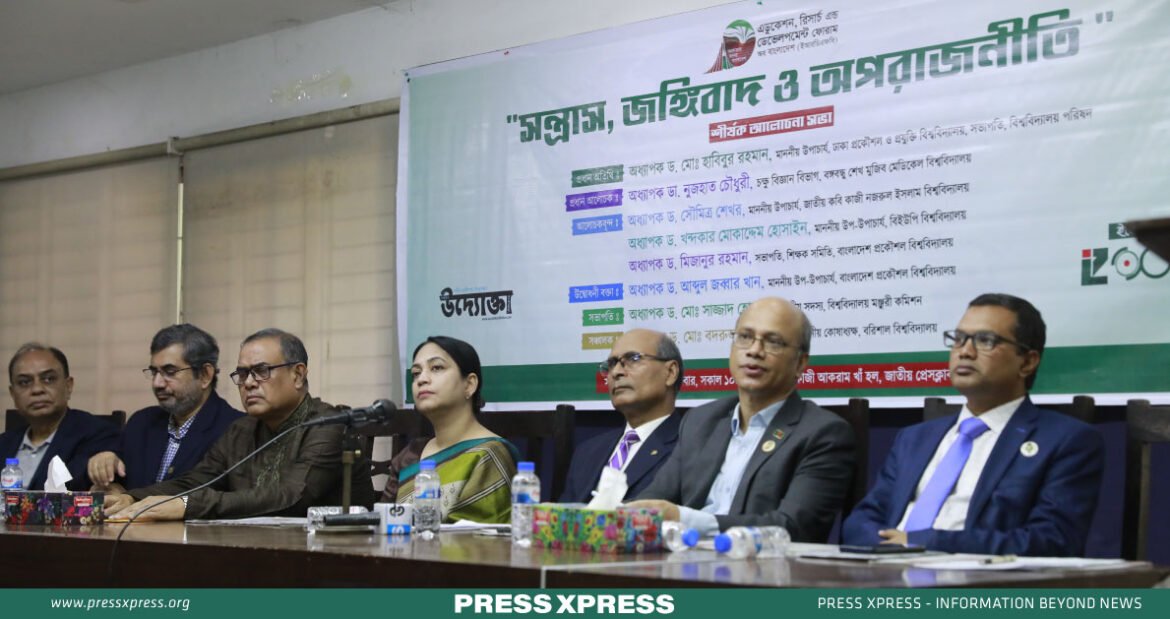The event organized by the Education Research and Development Forum of Bangladesh (ERDFB), underscored the political party’s historical manipulation of the nation’s instability through the utilization of terrorism, arson, and violence to advance its own self-interest and foreign influences
A high-profile discussion titled “Terrorism, Militancy, and Unconstitutionalism” was held at the Kazi Akram Auditorium of the National Press Club on November 3, 2023, at 10:00 AM. The discussion presented insights into recent detrimental activities coordinated by the BNP since the commencement of their political assembly on October 28. The event, organized by the Education Research and Development Forum of Bangladesh (ERDFB), underscored the political party’s historical manipulation of the nation’s instability through the utilization of terrorism, arson, and violence to advance its own self-interest and foreign influences.
The event was presided over by Professor Dr. Md. Sazzad Hossain, member of University Grants Commission of Bangladesh (UGC) and the chairman of the ERDFB and inaugurated by Professor Dr. Abdul Jabbar Khan, Pro-Vice-Chancellor of Bangladesh University of Engineering and Technology (BUET).
The event hosted several distinguished guests, including Professor Dr. M. Habibur Rahman, Vice-Chancellor of Dhaka University of Engineering & Technology, who served as the Chief Guest. Professor Dr. Nuzhat Choudhury of Bangabandhu Sheikh Mujib Medical University, Dhaka, delivered the address of the Chief Speaker. Professor Dr. Khondoker Mokaddem Hossain, Pro Vice-Chancellor of Bangladesh University of Professionals (BUP), Professor Dr. Md. Mizanur Rahman, President of the Teachers Association at Bangladesh University of Engineering (BUET), and Professor Dr. Soumitra Sekhar, Vice-Chancellor of Jatiya Kabi Kazi Nazrul Islam University, were among the other speakers.
Key discussions
The speakers emphasized that the recent upsurge in vandalism and violence serves as a continuation of the BNP’s track record of inciting turmoil and unrest throughout its history. They made reference to the party’s previous administration, which precipitated a decline in the nation, underscoring their events to sustain disorder through solicitation of assistance from Western powers.
The discourse revolved around the Western countries’ participation and the shaky execution of their “visa policy,” which prompted apprehensions regarding its absence of transparency and compliance with legal structures. Additionally, they deliberated on the manner in which the BNP’s implementation of the Indemnity Ordinance had facilitated extraconstitutional and unconstitutional governance that ultimately impeded the nation’s progress.
Moreover, the speakers underscored the BNP’s historical placement of personal and party interests above the well-being of the citizens. They also expressed concerns over the Western powers’ involvement in Bangladesh, which might be associated with a motivation to sow discord similar to that which they had previously achieved in nations such as Afghanistan and Pakistan.
The discourse raised concerns regarding the motivations underlying the BNP’s “Take Back Bangladesh” slogan, indicating that the party might attempt to reestablish the acts of violence, arson, and vandalism it had previously perpetrated during its government tenure.

Key highlights from the guests and key speakers
Professor Dr. Mohammad Habibur Rahman, the Chief Guest, highlighted in his address how Bangabandhu Sheikh Mujibur Rahman serves as an exemplary model for uniting people through politics and promoting human welfare. He emphasized that the ongoing acts of terrorism and anarchism by anti-independence forces, both domestic and foreign, are unacceptable obstacles to the nation’s progress. He called for the people of Bangladesh to stand against such adversarial forces.
In her speech, Chief Speaker, Professor Dr. Nuzhat Choudhury emphasized that human welfare should be the primary focus of politics. Terrorism, militancy, and arson can never be tools of politics. “The legacy of Bangabandhu and his political ideals continues to be overshadowed by the specter of anarchism in Bangladesh. Individual, party, and foreign vested interests are the driving forces of opposition, using politics as a cover for their anti-democratic activities,” she added.
Professor Dr. Sazzad Hossain, stated in his speech, “We are the nation of the victorious heroes in the liberation war. There is no place for any form of terrorism, militancy, or anarchy in the name of democracy and human rights in Bangabandhu’s democratic Bangladesh.” “Foreign conspirators’ attempts to provoke terrorism and militancy against independence must be countered by the triumph of the vote in the upcoming national election, through the euphoria of victory,” he emphasized.
Professor Dr. Soumitra Sekhar stated, “When politics is intertwined with anarchy, terrorism, and violence, these acts are orchestrated. In Sheikh Hasina’s democratic Bangladesh, there is no place for terrorism, militancy, or anarchy.”
Professor Dr. Khondoker Mokaddem Hossain, asserted, “Al-Badr and Al-Shams, collaborators of the Pakistani occupation forces in the great liberation war, are currently using terrorism, militancy, and anarchy as a weapon, exploiting the impoverished and vulnerable people of the country for financial enticement.”
Professor Dr. Mizanur Rahman, in his speech, mentioned, “The announcement of this terrorism, militancy, and anarchy began with the murder of children, including Sheikh Russel, on August 15, 1975, by the Bangabandhu family. The seeds of the 1975 August 15 incident have now transformed into a venomous tree, leading to police killings and widespread violence and arson in the name of the movement.”
The event was moderated by Professor Dr. Md. Badruzzaman Bhuiyan, treasurer of Barishal University and the general editor of ERDFB.


